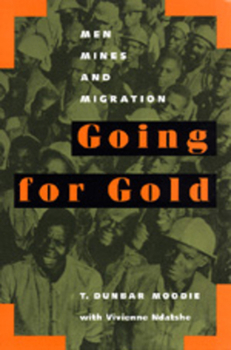Going for Gold: Men, Mines, and Migration Volume 51
(Part of the Perspectives on Southern Africa Series)
Select Format
Select Condition 
Book Overview
This book tells the story of the lives of migrant black African men who work on the South African gold mines, told from their own point of view and, as much as possible, in their own words. Dunbar Moodie examines the operation of local power structures and resistances, changes in production techniques, the limits and successes of unionization, and the nature of ethnic conflicts at different periods and on different terrains of struggle. He treats his subject thematically and historically, examining how notions of integrity, manhood, sexuality, work, power, solidarity, and violence have all changed over time, especially with the shift to a proletarianized work force on the mines in the 1970s. Moodie integrates analyses of individual life-strategies with theories of social change, illuminating the ways in which these play off each other in historically significant ways. He shows how human beings (in this case, African men) build integrity and construct their own social order, even in situations of apparent total repression.
Format:Paperback
Language:English
ISBN:0520086449
ISBN13:9780520086449
Release Date:September 1994
Publisher:University of California Press
Length:372 Pages
Weight:1.25 lbs.
Dimensions:0.8" x 6.0" x 8.9"
Customer Reviews
1 rating
Shaping Manhood Among South African Miners
Published by Thriftbooks.com User , 21 years ago
"Going For Gold" has drawn attention for its frank, insightful and fully-informed treatment of male miners' sexuality, including homosexual relations (known as "mine marriages"). But there is much more to commend Moodie and Ndatshe's exploration of what it means to be a man, and to act like one, in South Africa. Their intimate knowledge of the region combines well with participant-observer data, which must have been challenging to collect given the subject and circumstances. The result is one of the richest current studies of migrant life in Africa, encompassing changes in the labor process, ethnic identity, class formation, drinking and sociability, violence, and resistance to harsh work and living conditions. For example, the sections on faction fights between Sotho and Xhosa miners reveal that these are not merely age-old primordial hatreds. They reflect complex antagonisms rooted in struggles for employment, occupational status, class consciousness, political affiliation and situational identity, which all have discernible recent origins. While the book is pathbreaking, others have taken up these issues in various ways. In order of expanding regional scale, see C. Van Onselen, "Studies in the Social & Economic History of the Witwatersrand;" P. Harries, "Work, Culture & Identity;" R. Morrell ed, "Changing Men in Southern Africa;" J. Crush & C. Ambler eds, "Liquor & Labor in Southern Africa;" and L. Vail ed, "The Creation of Tribalism in Southern Africa." There is now a brand-new comparable study of migrant womens' hostels by G. Elder, "Hostels, Sexuality, & the Apartheid Legacy."






